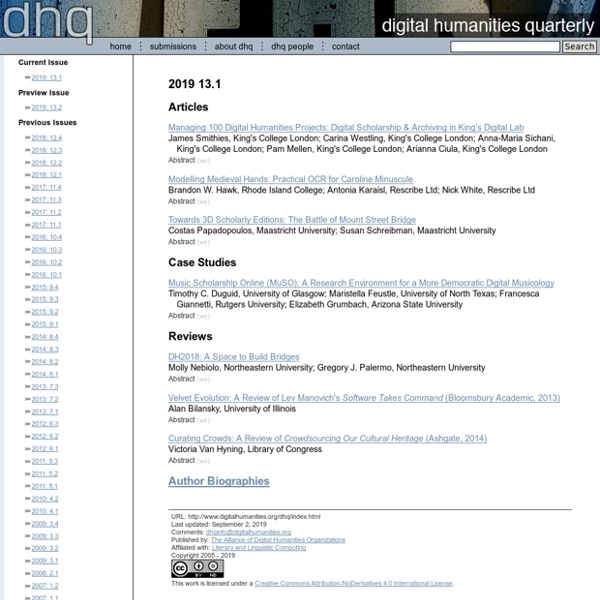DHQ: Digital Humanities Quarterly: Summer 2011

UCL Centre for Digital Humanities » Blog Archive » QRator in the Horizon Report: Museum Edition
By Claire Ross, on 19 November 2011 The QRator project , a collaboration between UCLDH, CASA and UCL Museums , funded by the Beacon for Public Engagement , has been chosen for inclusion in the 2011 Museum edition of the Horizon report, produced by the New Media Consortium . The Horizon Report is an international report about leading museum technologies. The report’s main aim is to identify and describe emerging technologies which will have a large impact over the next five years. The 2011 edition highlights six emerging technologies or practices that are going to have an impact on the sector and breaks them down into three distinct time frames or horizons. Here are the Technologies to watch: Near term Horizon (the next 12 months): Mobile Apps and Tablets. Mid term Horizon (2-3 years): Augmented Reality and Electronic Publishing Far term Horizon (4-5 years): Digital Preservation and Smart Objects. You can download the report from here
Humanistica | The future European Association for Digital Humanities
Social Science Research Network (SSRN) Home Page
Cahokia
Introduction to Digital Humanities | ENGL 668K at the University of Maryland
I wanted to write a last post about some ideas I had and things that happened to me during the course. I wanted to share them with you and I thought that this was the best place to do that. I enrolled in this course because of the reasons we were and are studying, especially in this last section. I was curious about DH because I like to build and transform things inside the field of literary studies. And I liked the fact that I can do something else in academia more than just writing papers, and I can share my writings with people I knew and unknowns, that they can help me writing and exposing ideas, that I can be creative with the way I presented my ideas, not just written ideas (without having to be a designer), and being in touch with a lot of things that are happening right NOW in many disciplines, especially literature. I never liked the way I studied at the academia, at least in Latin American literature (I do not think English is very different). Books were a sign of power.
On doing digital history – thoughts for new grad students « Electric Archaeology: Digital Media for Learning and Research
I’ve been asked this morning to talk to our new cohort of MA students on ‘doing digital history’. I thought about how I might do this. Typically, I’d throw together a powerpoint and begin talking about various tools, trends in the field, try to get a sense of what people are interested in, tailoring my comments to those topics. Today though, I’m trying a different approach. Like this: Like Loading...
The PLA Blog | Official Blog of the Public Library Association
I’m home again after a very interesting session about building a National Digital Public Library at the Los Angeles Public Library and I’d like to recap it while offering a few of my own opinions for the readers. Public librarians reading this post: a national digital library movement is most certainly underway, and quite frankly I think it may be the only thing that will prevent our libraries as we know them from simply fading from relevance. I’m aware that my opinions on these matters may be a bit controversial for those libraries and librarians kicking back out there, those that believe providing access to books for public consumption will remain a useful, supported service that your community will tax themselves to keep around. It was excellent to have so many strong voices from public libraries pondering the difficult predicament libraries find themselves in as content lenders in the digital environment. The meeting in Los Angeles was not about this path.
Open Access Archivangelism
Related:



